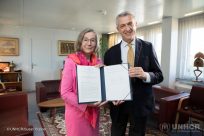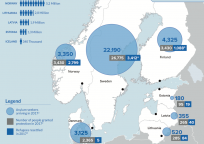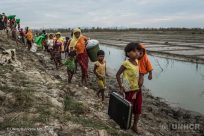From Syria to Sweden: Eiad´s perilous voyage across the Mediterranean
Eiad’s wife did not want him to embark on the perilous journey across the Mediterranean Sea to safety in Europe, but Eiad believed it was their only option. They had tried to build a new life in Egypt, but after two years in the country, Eiad realized he would not be able to provide a good future for his young children there. “Life wasn’t very good in Egypt”, he explains. In spite of his wife’s protests, Eiad decided to risk his life in a rickety boat sailing from Egypt to Italy. His wife and children returned to Damascus. “I was more worried about the kids”, he says. “I thought that if my life will finish, it will finish anyway – in Egypt, in the sea, wherever.”
After one and a half months of searching, he made contact with a human smuggler. The price for getting to Europe: 2,500 dollars. “We went in a group so it would be cheaper. The safest way to travel to Europe is through Turkey but it’s much more expensive. Sometimes, it can cost more than 8000 dollars per person” says Eiad. He describes the five-day boat journey to Italy with more than 300 others as “hell”- people were thrown into the boat and the smugglers did not care if they fell into the water. “If they had animals with them, they would take better care of them because they’re worth more to them”, says Eiad. Still, there was a sense of solidarity between passengers. Eiad recalls how two people almost fell off the boat in their sleep but were caught by the other passengers.
After reaching the shores of Italy, Eiad headed towards Northern Europe and arrived in Sweden on 12 October 2014. Coming here was a great relief, but life as a refugee has its daily struggles. “I miss my family” says Eiad, explaining how he had to adjust to his new life at the asylum-seeker reception centre in Farsta, Stockholm. “Starting over is not easy and leaving your country without your family… it’s hard. A lot of people who came here didn’t want to leave their lives behind in Syria. But it is impossible to give them back the same life here…They are forced to change” he says sadly.
For 36-year-old Eiad, a former shop and restaurant owner, living a slower paced life at the reception centre is a challenge. He often plays cards with some of the other people at the centre to make time pass faster and sometimes he also plays football. “But I have a problem with my back so I can’t do too much sport.” He believes life moves slower in Sweden. “In Syria, we do everything fast. A lot of Arabs find this very frustrating because we are always in a hurry” says Eiad with a laugh,
“We want things to happen faster, and we want to be reunited with our families sooner.”
Eiad says he has not started his life in Sweden yet, not without his family. “Your mind is not clear, it’s with your family, your kids, and you’re waiting to see them.” But despite the continuing concerns for his family, Eiad is hopeful for the future. “I want to finish my studies or work and study at the same time. I don’t like to sit still.” He hopes to use the skills he acquired as a restaurant owner in Syria to start a small restaurant in Sweden, serving Syrian food.
Eiad’s application for asylum has just been approved and he is waiting to be reunited with his wife and two sons, who are still in Syria. “My children are very excited about coming to Sweden”, says Eiad with a big smile. “My wife is worried because she doesn’t know anyone here and it’s strange for her. But I think she’s going to like it. She is an English teacher” he says proudly.
Page 31 of 33
-

Estonia supports UNHCR global operations to empower refugees in times of crisis
28.08.2018More than ever, UNHCR relies on generous donors like the Government of Estonia to provide life-saving help and protection to a record-high number of people forced to flee their homes.
-

Sweden signs record high USD 400 million funding agreement with UNHCR
11.07.2018The Government of Sweden marked this year’s World Refugee Day the 26th of June with a historic and record high multi-year, core contribution agreement with UNHCR. The agreement, worth SEK 3.5 billion, or approximately USD 400 million, covers the four-year period from 2018 to 2021.
-

Forced displacement above 68m in 2017, new global deal on refugees critical
19.06.2018Wars, other violence and persecution drove worldwide forced displacement to a new high in 2017 for the fifth year in a row.
-

UN High Commissioner for Refugees Grandi urges fair and coherent approach to European asylum policies
12.06.2018“The solution lies in countries working together. That means working together to provide safety to those who need it – through fair and coherent arrangements in line with the international framework that Europeans helped build.”
-

Students help refugee youth access education in Denmark
02.05.2018A group of university students in Copenhagen has established the initiative “Student Refugees” in order to help and guide young refugees to access higher education in Denmark.
-

Statistics on refugees and asylum-seekers in the Northern Europe region
12.04.2018The UNHCR Northern Europe factsheets give an overview of the 2017 data concerning asylum-seekers, refugees and stateless persons in the region.
-

Afghan refugee becomes fish expert in Norway
26.02.2018His road to success has not been easy, but Asif says that Norway is a good place for refugees willing to learn the language and work hard.
-

Refugees and Norwegians get together for first-class networking
18.01.2018Just south of the Arctic Circle, Mo i Rana in northern Norway welcomes refugees.
-

Lithuania steps up efforts for the forcibly displaced in 2017
01.12.2017In 2017, the Lithuanian government increased its annual funding to UNHCR, strengthening the protection of people forced to flee their homes in Afghanistan, Iraq, Myanmar and Syria.
-

New UNHCR report details changes in refugee and migrant risky journeys to Europe
23.11.2017A new report released today by UNHCR, the UN Refugee Agency, shows changes in the routes used by refugees and migrants to reach Europe during the third quarter of 2017.
